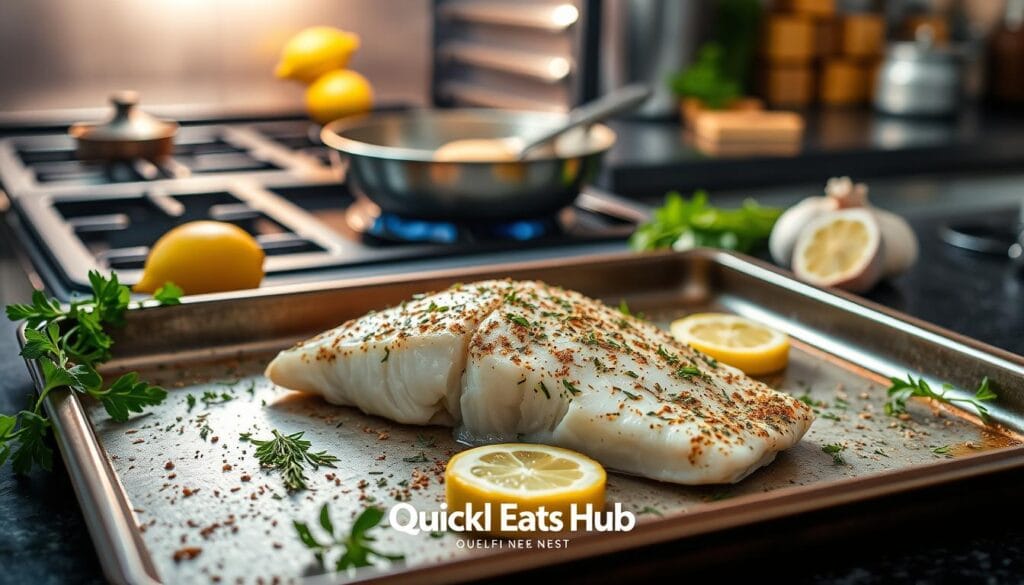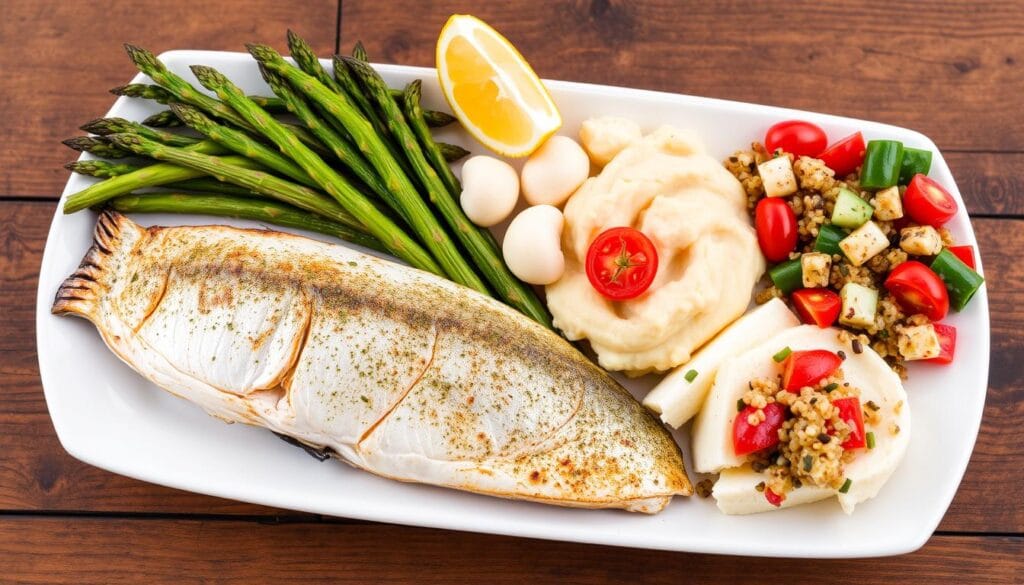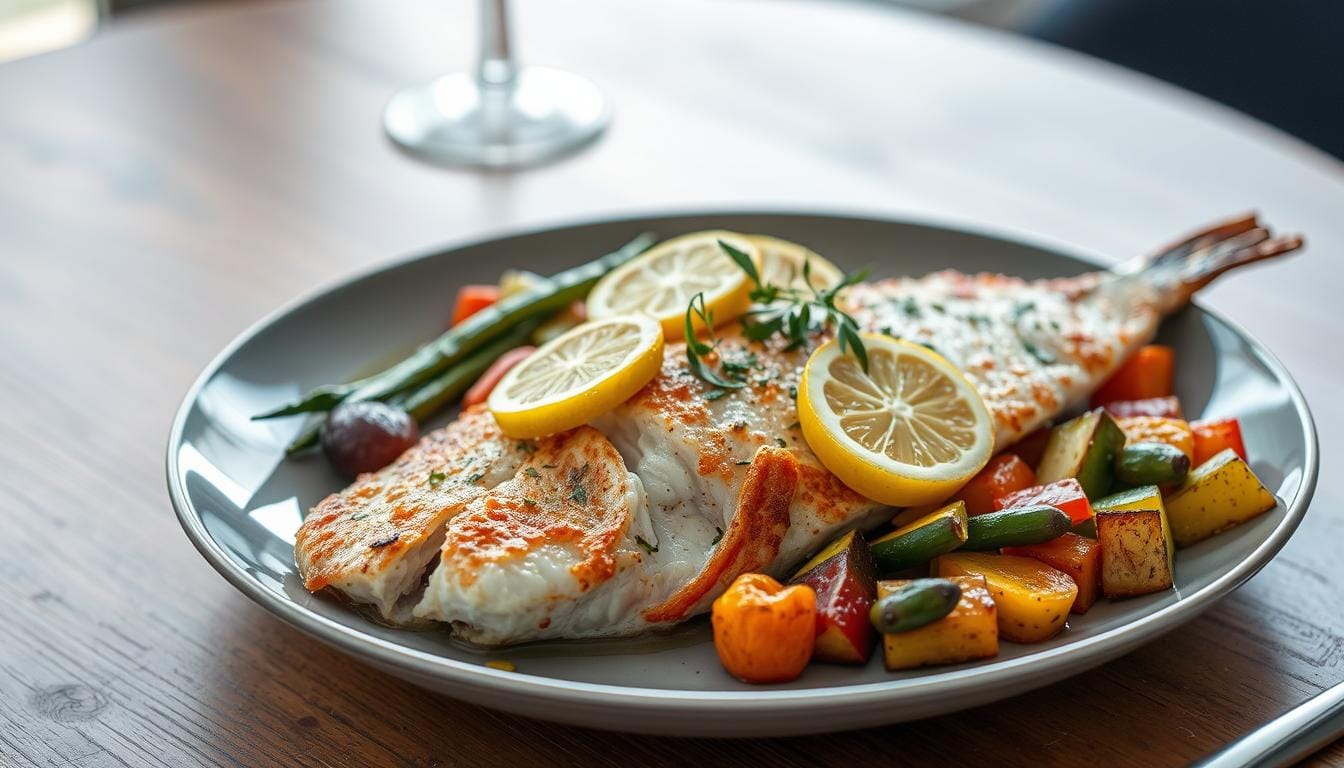Learning to bake swordfish can change your weeknight dinners. This dish is simple yet full of flavor. It’s a hit with home cooks who want fast, healthy meals.
Baking swordfish is easy and doesn’t require complex cooking. With just 30 minutes of prep, you can make a dish that wows everyone.
The secret to great swordfish is using top-quality steaks and the right cooking method. These steaks should be 6-8 oz and 1 inch thick. This ensures they cook evenly and stay moist.
Table of Contents
Understanding Swordfish: A Culinary Delight
Swordfish is a standout in Mediterranean cuisine, offering a unique dining experience. It has a taste that rivals many meat dishes, making it a hit with seafood lovers.
Why Choose Swordfish for Baking?
Swordfish is a top choice for healthy protein. Its meaty texture is perfect for baking, just like a steak. This makes it a delightful dish to enjoy.
- Exceptional meat-like texture
- Easy to prepare and bake
- Versatile cooking method
Nutritional Benefits of Swordfish
Swordfish is packed with omega-3s, making it a nutritional powerhouse. A single serving is full of nutrients that boost health. It’s also low in calories and high in protein, great for those watching their diet.
“Swordfish offers a perfect blend of taste and nutrition, making it a true culinary treasure.” – Seafood Nutrition Expert
Nutritional highlights include:
- High protein content
- Rich in selenium
- Excellent source of vitamin D
- Low in calories and carbohydrates
Pro Tip: Swordfish is healthy, but pregnant women should eat it carefully because of mercury. Cooking it well can help lower risks.
Preparing Your Baking Station
Setting up the perfect baking station is key for great fish preparation. Your kitchen tools are vital in turning a simple swordfish steak into a dish to remember. Professional chefs say the right baking gear makes a big difference in cooking.
- Sharp fillet knife for trimming fish
- Oven-safe skillet or baking dish
- Meat thermometer
- Cutting board
- Measuring cups and spoons
- Zester or fine grater
Selecting the Perfect Baking Dish
Your baking gear greatly affects the final dish. When picking a baking dish for swordfish, think about these points:
| Dish Type | Pros | Best For |
|---|---|---|
| Cast Iron Skillet | Excellent heat retention | Searing and oven finishing |
| Ceramic Baking Dish | Even heat distribution | Delicate fish preparations |
| Glass Baking Dish | Easy to clean | Lighter fish recipes |
Pro Tips for Fish Preparation
Experts say use a high-quality baking dish that can handle high heat. Swordfish steaks are 6-8 oz and 1 inch thick. Pick a dish that fits your fish well without crowding.
“The right tools transform cooking from a chore to an art form.” – Culinary Expert
Good kitchen prep is the first step to a tasty baked swordfish meal. It will surely wow your guests.
Selecting the Freshest Swordfish
Choosing quality fresh seafood is all about paying attention and knowing what to look for. When you’re searching for the best swordfish at your local fish market, knowing what makes a great cut can make a big difference.
There are a few key things to check when picking swordfish. Your eyes and senses are your best tools for finding the perfect piece for baking.
Tips for Buying Swordfish
- Look for steaks that are about one inch thick
- Seek out flesh that’s slightly pink to orange
- Check for a bright red bloodline, which means high-quality meat
- Avoid fish with a strong fishy smell
Identifying Quality Swordfish
When choosing premium swordfish, look for these signs:
| Quality Indicator | What to Look For | Red Flags |
|---|---|---|
| Texture | Firm and consistent | Soft or mushy surface |
| Color | Pale pink to light orange | Dark brown or grayish tint |
| Smell | Clean, ocean-like fragrance | Strong, unpleasant odor |
“The secret to great seafood is freshness and careful selection.” – Renowned Seafood Chef
Fresh seafood needs to be handled right. Most seafood should be cooked to 145°F. Pregnant women, kids, and people with weak immune systems should be careful with fish.
When buying swordfish, ask your fishmonger about where it came from and when it was caught. A good vendor will share important info about their seafood.
Seasoning Your Swordfish
Creating the perfect fish seasoning can make your swordfish go from good to amazing. The right mix of herbs and spices can turn your dish into a culinary masterpiece. It will make your taste buds dance with joy.
When making herb-crusted fish, it’s all about finding the right balance. Mediterranean spices are a great starting point. They add a flavor that makes your meal unforgettable.
Classic Seasoning Combinations
Your swordfish needs a flavor that stands out. Here are some classic seasoning mixes:
- Kosher salt and freshly ground black pepper
- Garlic powder and lemon zest
- Dried thyme and rosemary
- Paprika and crushed red pepper flakes
Herbs and Spices to Enhance Flavor
Take your fish seasoning to the next level with these herbs and spices:
| Herb/Spice | Flavor Profile | Best Pairing |
|---|---|---|
| Rosemary | Earthy and pine-like | Grilled swordfish |
| Basil | Sweet and peppery | Mediterranean-style preparation |
| Capers | Briny and tangy | Lemon-based marinades |
“The secret to great fish is not just in the cooking, but in the seasoning.” – Professional Chef
Pro tip: Always use freshly ground spices for the best flavor. Pre-ground spices lose their strength fast. So, grind whole spices right before you use them.
The aim of fish seasoning is to boost, not hide, the swordfish’s natural taste. Try out different mixes to find your favorite blend of Mediterranean spices and herbs.
The Importance of Marinating
Marinating turns a simple swordfish dish into a true masterpiece. A good fish marinade boosts flavor and keeps the swordfish tender. Learning how to marinate is key to a great seafood meal.
Top chefs swear by a quick marinade. The right lemon garlic marinade adds flavor and tenderizes the swordfish. Marinating techniques can greatly enhance your cooking.
How Long to Marinate Swordfish
Timing is crucial for marinating swordfish. Here are some important tips:
- Marinate for 15-20 minutes max
- Avoid marinating over 30 minutes
- Longer marinating can ruin the fish’s texture
*”The secret to perfect swordfish is a delicate balance of flavor and technique.”*
Best Marinades for Swordfish
Make a memorable fish marinade with these classic mixes:
- Lemon Garlic Marinade: Olive oil, fresh lemon juice, minced garlic, and herbs
- Mediterranean-inspired: Oregano, lemon, white wine, and olive oil
- Spicy Citrus: Orange juice, chili flakes, and fresh cilantro
A quick 15-minute marinade can add amazing flavor to your swordfish. The trick is to be gentle and strategic with your seasonings.
Baked Swordfish Cooking Techniques
Mastering oven-baked fish is all about precision and skill. Swordfish is a great challenge for home cooks aiming for a restaurant-quality dish. The right techniques can turn a simple fish into a culinary masterpiece.

To prepare perfect swordfish, you need to know some key cooking principles. Your goal is to get a crisp, flavorful crust while keeping the fish moist.
Oven Temperature and Timing
The secret to great oven-baked fish is precise temperature control. Here are the key guidelines for swordfish steaks:
- Preheat the oven to 400°F (200°C)
- Use 1-inch thick swordfish steaks (6-8 oz each)
- Bake for approximately 3-4 minutes per side
- Aim for an internal temperature of 145°F
Creating a Perfect Fish Crust
To get a golden-brown crust, you need a two-step process. First, sear the swordfish to lock in flavors:
- Heat a skillet to high temperature
- Sear each side for 2-3 minutes
- Create a beautiful golden-brown exterior
- Transfer to the preheated oven to finish cooking
“The key to perfect swordfish is understanding its delicate nature and respecting its cooking requirements.” – Culinary Expert
| Cooking Parameter | Recommended Setting |
|---|---|
| Oven Temperature | 400°F (200°C) |
| Searing Time | 2-3 minutes per side |
| Baking Time | 3-4 minutes |
| Internal Temperature | 145°F |
Pro tip: Let the swordfish rest for a few minutes after cooking. This helps the juices redistribute for maximum tenderness.
Additional Flavor Enhancements
To make your baked swordfish truly special, try using fish glazes and seafood sauces. The right mix can turn a simple meal into a feast that wows everyone.
Delicious Glazes to Transform Your Swordfish
Check out these tasty fish glazes to boost your swordfish recipe:
- Lemon Herb Glaze: Mix lemon juice, garlic, and parsley
- Spicy Chili Glaze: Blend honey, red pepper flakes, and lime zest
- Mediterranean Glaze: Combine olive oil, sun-dried tomatoes, and basil
Creative Seafood Sauces to Elevate Your Dish
Pair your swordfish with these seafood sauces for extra flavor:
- Classic Garlic Butter Sauce: Rich and creamy with white wine
- Tomato Olive Relish: Mix diced tomatoes, olives, and basil
- Caper and Lemon Sauce: Bright and tangy, great with rich fish
Stuffed Swordfish: Innovative Filling Options
Try these stuffed swordfish ideas to elevate your dish:
- Herb and Breadcrumb Mixture: Classic and crunchy
- Spinach and Feta Stuffing: A Mediterranean twist
- Seafood Medley: Mix shrimp, crab, and herbs
“The secret to an exceptional swordfish dish lies in the unexpected combination of flavors and textures.”
Remember, the secret to great seafood is finding the right balance. Try these glazes, sauces, and stuffings to make a dish that shows off your creativity and taste.
Side Dishes to Pair with Baked Swordfish
Choosing the right side dishes can make your baked swordfish meal special. Look for sides that match the fish’s flavor, add nutrition, and look good too.

When picking sides, mix light and hearty options. Out of 25 recipes, 8 are veggie-based. This shows people love healthy sides.
Light Salads That Complement Swordfish
Mediterranean salads are great with baked swordfish. They add fresh, zesty flavors that balance the fish’s richness.
- Greek salad with fresh tomatoes, cucumbers, and feta
- Arugula salad with lemon vinaigrette
- Herb-infused mixed green salad
Roasted Vegetable Medley for a Balanced Meal
A roasted vegetable medley is a hearty match for swordfish. Roasting is popular, used in 7 out of 25 recipes.
| Vegetable | Roasting Time | Flavor Profile |
|---|---|---|
| Asparagus | 15-20 minutes | Earthy, slightly bitter |
| Broccoli | 20-25 minutes | Nutty, robust |
| Bell Peppers | 25-30 minutes | Sweet, caramelized |
Try a light herb dressing on your roasted veggies. Cooking times range from 10 to 30 minutes. This makes them perfect for quick weeknight meals.
“A well-chosen side dish transforms a good meal into an unforgettable culinary journey.” – Coastal Cuisine Magazine
Storing Leftover Baked Swordfish
Keeping your baked swordfish fresh is important. You need to store it right and reheat it safely. This way, you can enjoy your meal without losing its taste or quality.
- Store cooked swordfish in an airtight container
- Refrigerate within two hours of cooking
- Keep the fish at a consistent temperature between 32°F to 38°F
Proper Refrigeration Techniques
Reheating seafood can be tricky. But, with the right method, you can keep the fish moist and flavorful. Refrigeration is key to maintaining food safety and extending the shelf life of your swordfish.
| Storage Method | Duration | Temperature |
|---|---|---|
| Refrigerator Storage | 3-4 days | 40°F or lower |
| Freezer Storage | Up to 3 months | 0°F (-18°C) |
Reheating Swordfish without Drying It Out
To keep your swordfish moist when reheating, follow these tips:
- Remove the fish from the refrigerator 15-20 minutes before reheating
- Preheat the oven to 350°F
- Place the swordfish on a foil-lined baking sheet
- Heat for 10-12 minutes until warmed through
- Avoid using the microwave, which can dry out the fish
“The key to great leftover seafood is maintaining its original moisture and preventing overcooking.” – Culinary Expert
By following these reheating seafood guidelines, your swordfish will stay delicious and safe. Remember, food safety is key to enjoying your leftover fish while keeping yourself healthy.
Common Mistakes to Avoid
Learning to cook fish well is all about mastering the art of swordfish. Many people struggle with making it dry. It’s key to know the common mistakes in cooking swordfish.
Cooking swordfish can be tricky, but with the right knowledge, you can create a delicious meal every time. Let’s look at the most critical mistakes that can ruin your meal.
Overcooking: The Silent Flavor Killer
Swordfish becomes dry and tough if it’s overcooked. The secret to perfect swordfish is in the temperature. Experts say:
- Cook to an internal temperature of 130 to 135 degrees Fahrenheit
- Use a meat thermometer for accuracy
- Remove from heat when fish is still slightly translucent in the center
The Critical Importance of Resting
Many cooks don’t realize how important it is to let swordfish rest after cooking. This step is crucial because it:
- Helps juice spread evenly throughout the fish
- Continues gentle cooking
- Keeps the fish moist and flavorful
“Resting your swordfish for 3-5 minutes can make the difference between a dry, tough meal and a succulent, flavorful dish.”
Marinating Mishaps
Proper marinating is key to avoiding dry fish. Here are some fish cooking tips:
| Marinating Time | Recommended Technique |
|---|---|
| 15-20 minutes | Prevents mushy texture |
| Too short | Minimal flavor absorption |
| Too long | Breaks down fish texture |
Pro tip: Always use acidic marinades sparingly to maintain the swordfish’s delicate texture and prevent unwanted chemical breakdown.
Serving Suggestions and Presentation
To make your baked swordfish a true masterpiece, focus on presentation. Your plating skills can turn a simple dinner into a fancy restaurant experience. A warm plate is the best base for your swordfish, keeping it at the perfect temperature.
Think creatively with your garnishes. Fresh herbs like basil or dill add color and flavor. Place lemon wedges around the plate for a personal touch. The swordfish, packed with 33 grams of protein, looks great on a bed of sautéed veggies like yellow peppers and fennel.
Chefs suggest spooning pan juices over the fish for extra moisture and taste. The crispy breadcrumb topping is a highlight when presented well. Plating is an art that makes a simple dish unforgettable.
Plating Your Baked Swordfish
Use white or neutral plates to highlight the swordfish’s golden color. Place the swordfish at an angle to show off its edges and herbs. A drizzle of olive oil adds a glossy finish, making it look like a restaurant dish.
Garnishes to Elevate Your Dish
Choose garnishes that match the swordfish’s rich taste. Fresh basil, lemon slices, and parsley can elevate your dish. Aim for a presentation that promises a delicious meal.

